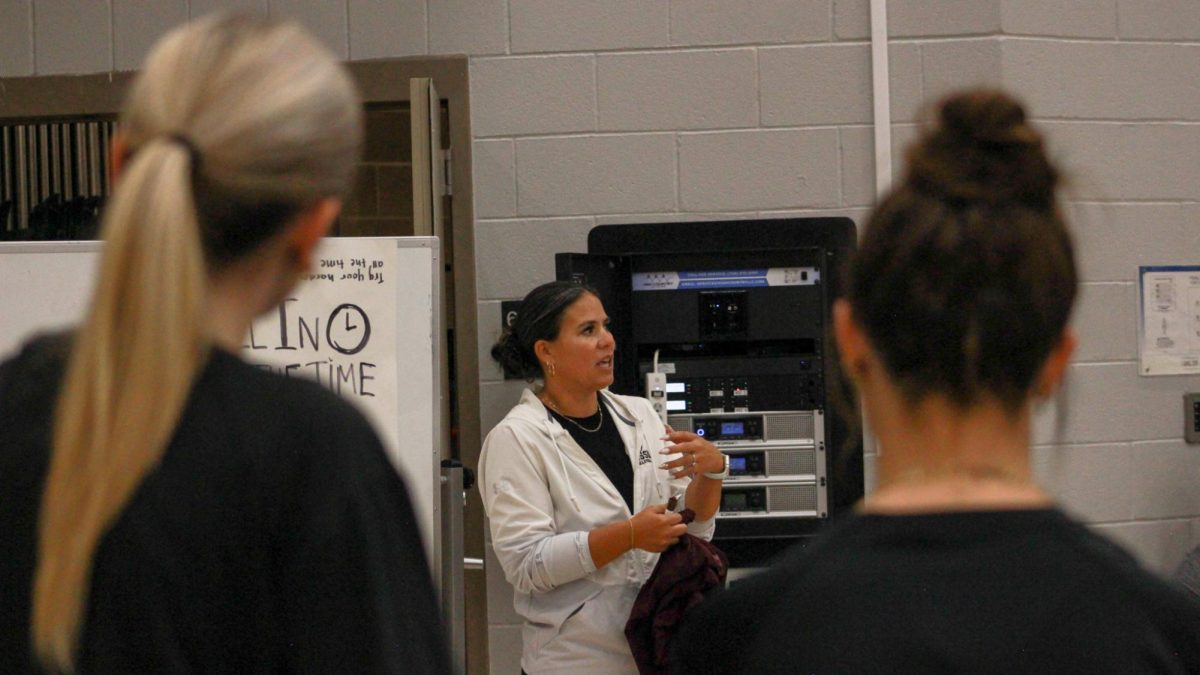“In Iowa, we still know right from wrong, boys from girls.”
Iowa Governor Kim Reynolds’ polarizing statement in the last ad of her 2022 re-election campaign has only been reinforced by her legislation targeting gender identity in schools.
Reynolds signed Senate Files 538 and 482 in March of 2023, rejecting the rights of trans youth to gender-affirming medical care and the ability to use school facilities aligning with their gender identity.
Her most recent attack, however, was Senate File 496. In addition to banning books from school classrooms and libraries and removing HPV and HIV information from select curricula, the legislation prohibits schools from giving “false or misleading information to the parent or guardian of a student regarding the student’s gender identity or intention to transition to a gender that is different than the sex listed on a student’s official birth certificate”.
Though signed on May 26 2023, students and staff at Pleasant Valley are only now beginning to see its effects. Starting in this 2023-2024 school year, teachers may not call students by a nickname, preferred name, or pronoun other than what is in their Student Portal without parental consent.
Requiring notice of identification changes clearly fixates on gender identity, but the law has also hit one unexpected area: orchestra uniforms. In the past, students have had the option to choose between wearing a dress or a tuxedo during performances. However, before giving out the clothing this year, high school orchestra director Robert Swinney informed students that those with an M by their name would receive a tuxedo and those with an F, a dress.
Not having seen uniforms as a point of conflict, this change seemed unnecessary to many students. “I find it strange that this is the topic the government chooses to spend time on. They’re making school administrators and teachers spend more time trying not to do something illegal by accident,” expressed junior Jocelyn Bock, a member of the orchestra. “It will certainly affect the amount of time that directors have to use worrying about uniforms instead of music class.”
As with name and pronoun preferences, students may wear the opposite uniform if parental consent via email to Swinney is given. “The change in the law just specifies that we have to have documentation,” explained Swinney. “As a public school employee, I just have to make sure that we are following the law and trying to make everyone feel as welcome and supported as I can.”
Still, this stipulation is unreasonable and emotionally harmful. Students with parents unwilling to consent are simply denied the right to their preferred clothing. In cases of gender queer and transgender students who have not communicated their identity to their parents, the options left become a forced outing or, more likely, the inability to wear their preferred uniform.
Concerning a similar situation of parent notification in the case of pronoun change, Chino Valley Unified School District in California is being sued. “For far too many transgender children and gender nonconforming youth, school serves as their only safe haven — a place away from home where they can find validation, safety, privacy,” said California attorney general Rob Bonta.
Students deserve to feel comfortable and accepted in schools. They should be able to participate in school programs without being singled out. Instead, Reynolds’ policies dictate how they are to dress and identify, labeling them as abnormalities to the expectation of heteronormativity.
Iowa’s new legislation undoubtedly targets LGBTQ students. Aside from this, though, the rule raises another question: What about wearing a dress or a tuxedo definitively signifies “gender identity or intention to transition?”
Unlike a traditionally gendered name or pronoun change that specifies how someone prefers to be addressed, clothing is not permanent, nor does it make an explicit statement about identity. A person’s attire evolves not just on a daily basis, but also in response to trends and shifts in societal norms.
For example, aside from brief wartime popularity, women wearing pants was largely frowned upon in the US until the 1960s and 70s. Presently, though, pants are no longer seen as inherently masculine, and suits are commonly considered gender neutral. “I think it’s weird that I would need a parent’s permission if I wanted to wear pants as part of my uniform. Dress pants have been considered appropriate formal wear for women for so long,” voiced Bock.
Clothing should not be decisively classified as masculine or feminine, especially as fashion continues to expand. If an outfit can not be an absolute indicator of gender, how can a girl’s choice not to wear a dress mean that she is questioning her gender identity, or vice versa?
There is no “misleading information” when it comes to how students feel comfortable dressing. Clothing is simply a form of self expression, yet lawmakers refuse to let go of antediluvian stereotypes.
Despite any inspirational calls to action, educational reform in Iowa undoubtedly continues to damage students and undermine their freedoms. As increasingly restrictive regulations are put in place, students are demoralized by their rapidly diminishing autonomy and authority.
This story was originally published on Spartan Shield on September 11, 2023.




































